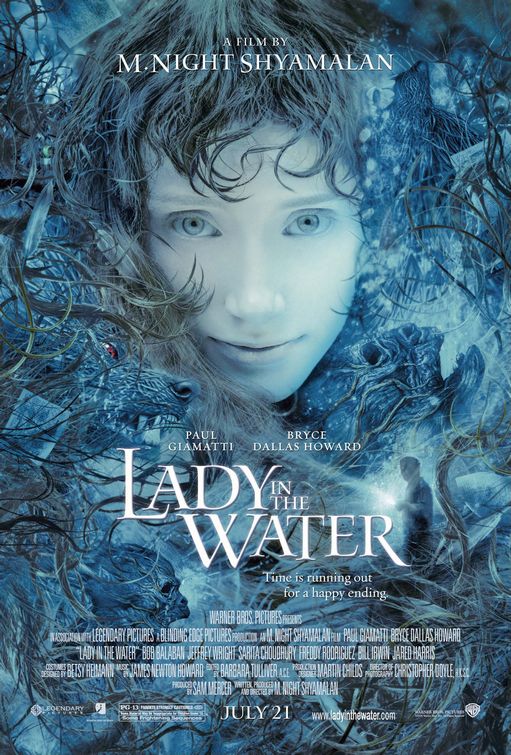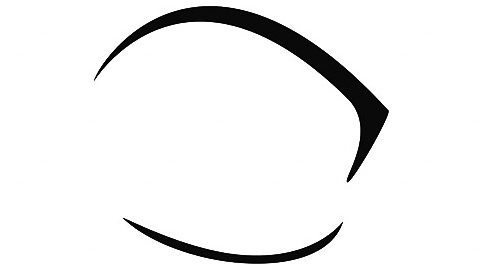Lady in the Water–A Review
 Boy, the things a guy’s got to go through to tell a bedtime story these days.
Boy, the things a guy’s got to go through to tell a bedtime story these days.
If you’re director M. Night Shyamalan, it means that first you part ways with long-time partner Disney after they excoriate your latest project, Lady in the Water. Then when the film is produced and released by Warner Brothers, it means you must run a gauntlet of cynical and surly critics, the same ones that mercilessly panned your signature film, The Sixth Sense, when it debuted (plus every movie you’ve released since). While Shyamalan seems somewhat hurt and nonplussed by all the fuss (listen here to his comments from an NPR interview broadcast the day before the movie’s release), he remains confident that his vision will be accepted by both his longtime, core fans and moviegoers at large.
From a bedtime story that he originally created for his children, Shyamalan constructs a present-day fable set in an apartment building (The Cove) populated by a cast of quirky, misfit characters. These include: a chatty Asian college student and her sharp-tongued, suspicious mother, a fitness buff who works out only one side of his body, a crossword puzzle aficionado and his young son who sees omens on the back of cereal boxes, a harsh and snooty movie critic and a gaggle of apparently unemployed, chain-smoking pseudo-intellectuals who sit around holding forth on the issues of the day and trying to create the next great cultural buzz phrase. They are all caught up in and borne along by postmodern drift, isolated by the walls of their apartments, but close enough to collide and bump against each other in aimless, incoherent, and often humorous fashion.
The apartment building superintendent, the reliable, but stuttering Cleveland Heep (played with sublime brilliance by Paul Giamatti, son of the late baseball commissioner A. Bartlett Giamatti), attends to the mundane tasks of replacing blown light bulbs and repairing broken appliances in steady, unassuming fashion. His humane presence is a comfort to the apartment dwellers, but he is a man who bears a great wound and conceals his own dark secret. He hides here, concealed by the camouflage of the ordinary, but the extraordinary soon seeks him out in the form a nymph-like “narf” named Story (hauntingly handled by Bryce Dallas Howard) who is a character in an epic, bedtime story and has been living beneath the complex’s swimming pool. She is a messenger from “The Blue World,” sent to seek out and inspire a writer whose words are destined to change the course of humanity.
She befriends Cleveland, sensing that he will listen to her and believe her story and help her carry out her task. With the help of a suspicious Korean mother who speaks no English, Cleveland slowly starts to piece together the old fable and eventually helps Story make contact with the writer. Her mission accomplished, she must now return to her world as “Queen” of the narfs, but a rogue “scrunt” (an evil, wolf-like creature) is waiting in the tall grass to block her return and destroy her. Cleveland must now locate others in the complex whose special gifts and abilities are needed to help Story safely return home. As they gather around a pool shaped like a collapsed heart and together face the menance of the scrunt, each discovers his or her true purpose and the previously unseen ties that bind them together in a common pursuit.
Like his previous movie Signs, Shyamalan’s latest work functions as a counterweight to the postmodern notion that we are are all adrift, individual narratives desperately seeking an elusive metanarrative which will bind us together in a meaningful and coherent framework. Perhaps it is Shyamalan’s audacity to dream that such metanarratives may exist, and that they may be true, that is the burr in the backsides of the critics who are frothing at the mouth over his latest work. Then again, it may be the fact that Shyamalan takes a direct stab at his naysayers themselves in the form of the movie’s most unlikable character, Harry Farber (played to prissy perfection by Bob Balaban). Harry is a tired, cynical movie critic who thinks he has seen it all. He shrugs his shoulders and proclaims that “there is no originality left in the world,” but in his own moment of truth, discovers that there is still “something new under the sun.”
With its emphasis on a “higher calling,” and the necessity of bravely confronting the evil which threatens to devour, Lady in the Water will resonate with many Christians who, after all, profess their belief in “The Greatest Story Ever Told.” It is apparent from the childlike eagerness of the characters to believe a seemingly far-fetched and fanciful tale, that man longs for meaning in his short sojourn and for reassurance that we are not alone–that our lives are not mere dust–but instead serve some sort of overarching, cosmic purpose. As one character exclaims in a pivotal scene, “It’s time to prove some stories are true!.” While not an overtly Christian message, Shyamalan points toward the sustaining role of myth in man’s search for purpose and meaning, bringing to mind the words of C.S. Lewis, who dubbed Christianity the True Myth, an epic story that actually occurred in historical space and time.
I’ve seen the movie (twice). I’ve read the reviews at Rotten Tomatoes, and they are nearly unaminous in their overly-harsh upbraiding of Shyamalan’s lightweight, but oddly moving and lyrical fantasy. My advice? Forget the critics, go see the movie and suspend your disbelief–you won’t regret it. In a summer which has given us an impotent and disappointing “blockbuster” like The Da Vinci Code, along with grotesque, steroid-enhanced sequels such as Mission Impossible III and Pirates of the Caribbean–Dead Man’s Chest, Lady in the Water is, if not a feast, a delightful and delectable snack for the soul.
11 Comments
Comments are closed.

Ed
Hey, nice review. This is one I’ve been wanting to see, but haven’t worked in the time yet. I have seen the bad press too, but the “needed to see it to believe it” attitude was in my head. I’ve become a big fan of M. Night’s movies because of they way he weaves an intricate story, working in the right amount of intensity and thrill, and then the thought-provoking punch of humanism. Maybe we’ll wander down to the Rave this week.
GREG
I’ve like all of Night’s films, although Sixth Sense is still my favorite. I heard a lot of bad about The Village, but I liked it (even though the “twist” was something I had assumed from the beginning.) I won’t be going to the theater (for I rarely do), but I’ll look forward to the DVD.
Mike the Eyeguy
Ed–
I’m thinking that critics have become so jaded from their line of work and the people they hang out with that they simply can’t let go and enjoy a good fairy tale anymore. This is one of those situations that “becoming like a child” can be very helpful.
Greg–
The Sixth Sense was so stunning in its paradigm shift that now many expect the same thing everytime Shayamalan produces a new one. I’ve liked all his films in one way or another, some more than others, and the Village was no exception, despite the harsh reviews.
Ed
Looking forward to your review of Talladega Nights – The Ballad of Ricky Bobby!
Mike the Eyeguy
Ed–
I’m thinking I’ll let one of the boys do a guest review on that one. 🙂
Jason Bybee
Mike,
I saw Lady last week with my brother in law. I loved it. Of course, I love all of Shamaylan’s work (Signs is my favorite).
No doubt the critics who are panning Shyamalan’s latest effort were taken aback at the fate of Harry, one of my favorite moments in the entire film. Giamatti was strong as always. I didn’t expect the director to give himself so much face time. I thought he performed admirably, but he usually assigns himself a lower-key role. I think Shyamalan suffers from producing a GREAT first film. Everything he does will always be compared to The Sixth Sense.
Mike the Eyeguy
Agreed. I was surprised at M. Night’s more-than-cameo appearance, but he wasn’t horrible or anything. Still, he must have violated some unwritten, sacrosanct Hollywood rules on that judging from the way many took him to task for it.
Signs is my favorite too. I’ve actually used clips from that to teach class before. Phoenix and Gibson were great together.
Bill Gnade
Mike,
Thank you for defending Mr. Shyamalan’s work.
You know, what strikes me as amazing is how literal everyone is getting these days. I mean, it is clear to me that Shyamalan’s critics are unable to see the figurative, the lyrical, the poetic and hidden, in Shyamalan’s work. “Signs” is not at all about aliens; it is about faith, the prophetic utterance, and how prophecy — the voice from outside — restores hope and purpose. “The Sixth Sense” is not about seeing dead people; it is entirely about redemption and coming to terms with death at the point of death (and the empty life that led to it, with all of life’s little “neglects” and oversights).
I look forward to seeing “Lady in …” because I know that I will have to look at the film as story, as symbol, and not as a literal image. It is like the wonderful Tim Burton film, “Big Fish”; literalists who live in the concrete simply cannot get it. Thanks for not being one of them.
Peace.
BG
Mike the Eyeguy
Very well put. Many of the critics do seem to be “literalists” insisting on a narrative that comports to their view of “reality.”
So, here’s what I’m wondering. Are these folks unrepetent, entrenched modernists hanging on for dear life, or are they postmodernists who screw up their faces in revulsion at a story which purports to bind people together in a common cause against something as quaint as “evil”(shouldn’t we be willing to listen to the scrunt’s story and POV? After all, maybe he was oppressed by the narf at some point in the past)?
Is Shyamalan himself a postmodernist, modernist or traditionalist? Is he critiquing postmodern din or is he simply adding to the noise with his own new age spiritualism?
I need help, Bill, I think I’m deconstructing!
Ariel
I’ve read many reviews about this movie, only yours worked for me.
I don’t think Night Shyamalan is trying to say he can makes this world a better place, but *hopes* that this world could be a better place. There’s nothing about egoilsm, really.
Mike the Eyeguy
Thanks for stopping by and reading it, Ariel. I’m glad you like it.
Yes, I think “hope” is it exactly. MNS recognizes that the world is a dark place and is very much in tune with the unease that so many feel these days. Yet, he holds before us the possibilty that there are even more positive forces working for good, ones that eventually will overcome the evil that threatens.